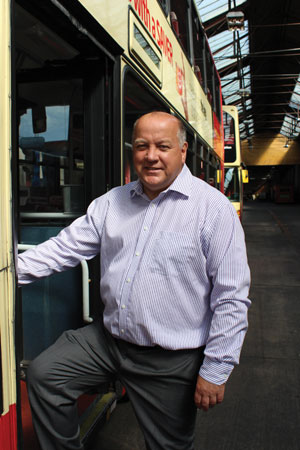Latest News: Frank le Duc
Bus company travelling in the right direction to reduce exhaust emissions in one of the most polluted streets in Brighton and Hove
Two research projects in the Brighton and Hove area will potentially help us all to breathe more easily. One project involved Brighton and Hove Buses and scientists at the Shoreham premises of the global engineering consultancy Ricardo. The other will be led by academics at Brighton University, working with colleagues from Oxford University, Brunel University and University College London. The second project is also supported by Ricardo.
Engineers from the Shoreham firm fitted specialist measuring equipment to three types of bus, including one with a hybrid engine. The tests were carried out along the route of the number 7, which includes North Street, one of the most polluted streets in Brighton.

Buses account for almost four in ten journeys up and down North Street, which has high-sided buildings. As with London Road and Western Road, these help trap exhaust fumes. Lorries make more than one in 20 journeys up and down North Street. Taxis and vans – predominantly diesel-fuelled – make up almost all of the rest.
The research found that the stop-start nature of journeys up North Street were a key contributor to the poor air quality. It concluded that smoother traffic flow would significantly reduce bus emissions. The findings were presented to Brighton and Hove City Council two months ago as it looks at ways to improve air quality with increasing urgency.
Anything that smoothes the flow of traffic is likely to cut fuel consumption as well as emissions. This would help with the bus company’s operating costs – fuel is a big overhead. A different financial consideration is also a driver for council members and officials.
“It is vital that any action taken to address the problem is based on evidence”
Brighton and Hove is part of one of 16 air quality zones in Britain that have failed to meet the standard set by the European Union. There are 43 zones in total. As a result of the poor air quality in Brighton and the other polluted areas, the EU is taking Britain to court. The case is expected to cost up to £300 million in fines for each year of sub-standard air quality. The government has been contemplating whether councils, including Brighton and Hove, should foot the bill.
The prospect of a huge fine was one of the factors that led the council to agree to set up a low emission zone earlier this year. It is due to come into force next January. It will cover North Street and Western Road – the corridor used by 19 out of every 20 buses in Brighton and Hove.
The council and Brighton and Hove Buses won £700,000 from the government last year to retrofit 50 vehicles to reduce the amount of air pollution that they produce. Some hope that more funding can be won to help cabbies so that they can also upgrade their engines.
Martin Harris, managing director of Brighton and Hove Buses, said: “The excellent technical research undertaken by Ricardo has confirmed that we are travelling in the right direction with investment in our fleet and in working with partners to reduce delays and stop-start traffic flows for buses that adversely impact on the environmental performance of our fleet.
“The research has also informed us of a number of opportunities to further improve our environmental performance. This will flow through to improved emissions which will benefit everybody through cleaner air.”
Councillor Ian Davey, deputy leader of the council and lead member on transport, said: “Brighton and Hove, like many cities, suffers severe air quality problems in our densely populated and intensely used urban centres. We know that the main contributor is vehicle emissions yet there is no easy solution. It is vital that any action taken to address the problem is based on evidence.”
Meanwhile, Brighton University has won £1 million to lead a project to develop ultra-efficient engines and fuels. The aim is to enable vehicles to travel further on less fuel – with near-zero emissions.
Brighton is developing, among other things, a reputation as a centre of excellence for environmental technology, with businesses profiting from plotting a more sustainable route.




















